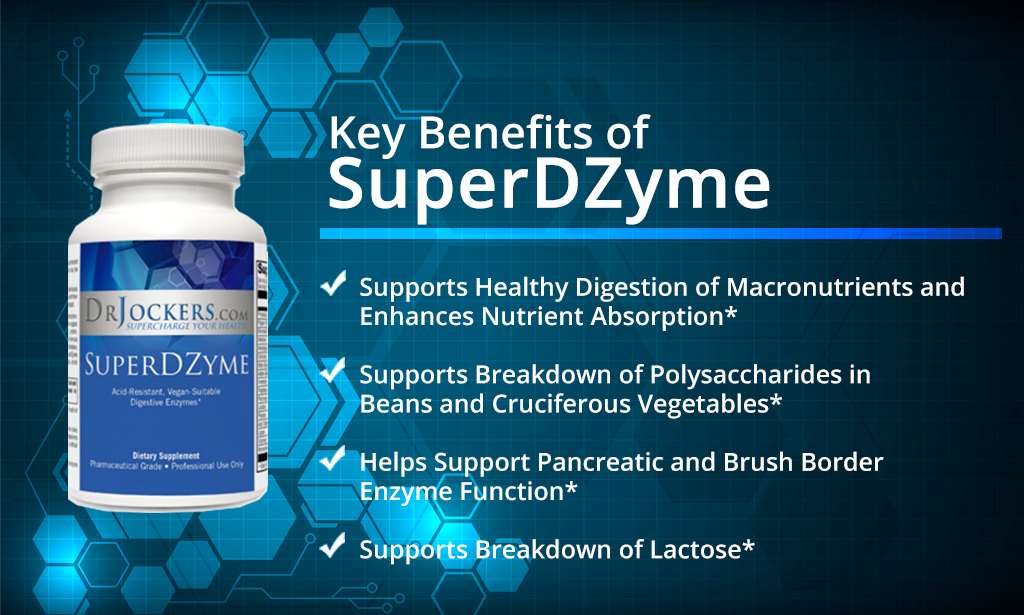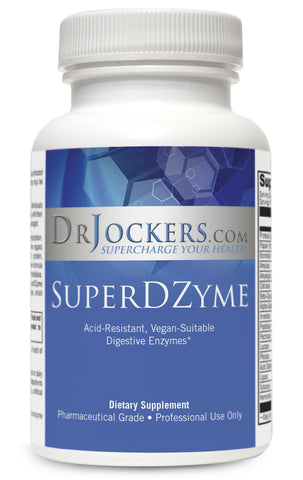
Super DZyme supports the healthy digestion of macronutrients, enhances nutrient absorption, supports the breakdown of polysaccharides, and helps the breakdown of lactose.- Dr. Jockers
Let's discuss the key benefits of Super DZyme:
Why choose Super DZyme

I started using this product to compare to a different product that I have been using to help me with my multiple food intolerances. The Super DZyme works 100% better than the other product! I am very happy with it and will be buying this one on a regular basis. - Sharon
Read our customer reviews and you'll see why our clients agree these are...
Supplements You Can
TRUST
Super DZyme

Enzymes are extremely vital to human well-being. They play a critical role in digestion and nutrient assimilation, immune response, cognitive acceleration, and cellular detoxification among other things. These systems battle for enzymes to utilize within our body. It is key that we get a wide variety of enzymes to improve our digestion.
Enzymes are some of the most important structures in the body. They are long-chain proteins that take on specific shapes and act like keys to unique locks throughout the body. Their job is to carry out very specific functions throughout the body. Most of the digestive enzymes are produced by the pancreas and are therefore called pancreatic enzymes.

How do enzymes affect the digestive process?
Enzymes are extremely key for breaking down carbohydrates, protein, and fatty acids and preparing them for proper digestion and assimilation in the body. Individuals with digestive challenges are often unable to produce sufficient quantities of digestive enzymes and are unable to effectively digest the food they are eating (1, 2).
Improper digestion can cause significantly more stress and inflammation in the gut lining which ultimately leads to the degradation of the mucousal membranes and the complications of leaky gut syndrome. When the mucousal membrane is damaged it is then unable to secrete the appropriate enzymes and we end up with a vicious cycle that causes more gut inflammation.

What are the symptoms of low pancreatic enzymes?

What are some enzymes for improving digestion?
Some of the key enzymes that break down various carbohydrates and fibers include lactase, amylase, cellulase, hemicellulase, invertase, glucoamylase, alpha-galactosidase, beta-glucanase, pectinase, phytase, and xylanase. These enzymes help to metabolize various sugars and fibers, which can aid in reducing inflammation in the gut and the development of small intestinal bacterial overgrowth (SIBO) (3).
Amylase:
This is an enzyme produced in both are saliva and by our pancreas and secreted into the small intestine. Amylase helps the body to metabolize sugar and starch and turn it into glucose.
Glucoamylase:
This enzyme breaks off a free glucose molecule from the complex sugar-based chains that form starch, disaccharides, or polysaccharides. The glucose can then be freed up as a source of energy for the body.
Invertase:
This enzyme breaks down sucrose into fructose and glucose. Sucrase is secreted by the tips of the villi of the small intestine.
Lactase:
This is an enzyme that helps break down the sugar lactose into glucose and galactose. Many people are deficient in the enzyme lactase and are unable to process lactose which leads to serious gastrointestinal distress and chronic inflammation.
Exogenous administration of lactase can support lactose digestion effectively and allow for continued consumption of milk-based products.[4,5] Maintaining a healthy gastrointestinal flora helps support brush border function and digestive capacity as well.*[6]
Alpha-Galactosidase:
This enzyme hydrolyses the terminal alpha-galactosyl moieties from glycolipids and glycoproteins found in starchy carbs. This enzyme is the active ingredient in Beano, Bean-Zyme, and Gas-Zyme 3x and helps the body reduce gas production (7,8).
This key enzyme helps break down the real tough polysaccharides and oligosaccharides found in foods that are tough to digest like nuts, beans, lentils, and cruciferous veggies.
Cellulase and Hemicellulase:
These enzymes break down the major fibers in fruits and vegetables called cellulose and hemicellulose. Cellulase breaks down cellulose into beta-glucose and hemicellulase metabolizes hemicellulose. Glucose from cellulose is released slowly and should not dramatically increase blood sugar but rather provide a more stable fuel for the body.
Beta Glucanase:
This is a group of carbohydrate enzymes that break down glycosidic bonds within beta-glucan. These glucans also create up to 60% of the cell wall of many forms of fungal organisms such as C. albicans and candidal biofilm (the common experience of candida in the gut).
Pectinase:
This enzyme helps to metabolize the pectin wall of vegetables. This is crucial because pectin is a gelatinous matrix that helps cement plant cells together and in which other cell wall components, such as cellulose fibrils, are embedded. Therefore pectinase enzymes are huge for the complete digestion of many fruits and vegetables.
Phytase:
Phytase is present to facilitate the breakdown of indigestible phytates (phytic acids) from grains and seeds and release phosphorus, calcium, inositol, and other nutrients for absorption.
Xylanase:
These enzymes break down the polysaccharide beta 1,4-xylan into xylose. This is one of the keys to breaking down the plant cell wall for optimal digestion.
Proteolytic Enzymes:
Proteolytic enzymes are necessary to metabolize protein molecules into amino acids. When individuals have a compromised digestive tract they are unable to secrete adequate amounts of these proteolytic enzymes and they end up with large protein molecules that further irritate the gut and poor amino acid absorption which leads to deficiencies.
Protease and Peptidase:
Protease is a type of enzyme that functions mainly to help us digest different kinds of proteins. They break down the bonds by a process known as hydrolysis and convert proteins into smaller chains called peptides or even smaller units called amino acids.
Bromelain:
Bromelain is a protein-digesting enzyme complex found in the fruit and, in higher concentrations, in the stem of the pineapple. It can hydrolyze or break down a wide variety of protein types in a range of both acid and alkaline environments.
Papain:
Papain is a powerful digestive enzyme commonly found and extracted from the papaya fruit, it is also referred to as papaya proteinase. The papaya enzyme papain plays a key role in digestive processes involving breaking down tough protein fibers. For this reason, it has been commonly used in its native South America as a digestive support for meat eating.
Lipase:
Lipase is an essential enzyme for the digestion of fatty (lipid) substances either in the diet or as a part of normal human metabolism. It is responsible for breaking down fats into smaller components that can readily be absorbed through the intestines.
Why does Dr. Jockers love this product?
This is a great product for a number of reasons including:
- Includes a wide variety of enzymes: Many different enzyme subtypes to give a wide array of effects and address all digestive enzymatic effects. This includes carbohydrate-metabolizing enzymes, proteolytic enzymes, and fat- metabolizing enzymes.
- Functions in a wide pH Range: There are significant pH ranges in the stomach and small intestine. These enzymes are formulated to survive and thrive in a number of different ranges.
- BioAvailable enzymes are key to reducing intestinal stress: Intestinal stress is a major contributor to the formation of leaky gut syndrome. Bioavailable enzymes reduce the stress on the gut and improve nutrient absorption.
SuperDZyme™ is a cost-effective, non-prescription, broad-spectrum, digestive enzyme formula suitable for vegans and designed to support the digestion of fat, protein, carbohydrate, fiber, and lactose. This comprehensive formula contains lipase, proteases, alpha-galactosidase, hemicellulase, papain, lactase, and other key digestive enzymes. SuperDZyme works in a wide pH range—unlike porcine pancreatin, which works in a narrow pH range.
What is the recommended dosage?
Normal Dosage: 1–2 capsules with each solid food meal
Advanced Dosage: 2–4 capsules with each solid food meal
When introducing a new supplement, we recommend taking the lowest dose for 2-3 days. As tolerated, increase the dose until you have reached the recommended normal or advanced guidelines. Reduce to a tolerable dosage if adverse effects occur.

Select Your Options & Add to Cart
† These statements have not been evaluated by the Food and Drug Administration.
This product is not intended to diagnose, treat, cure or prevent any disease.






